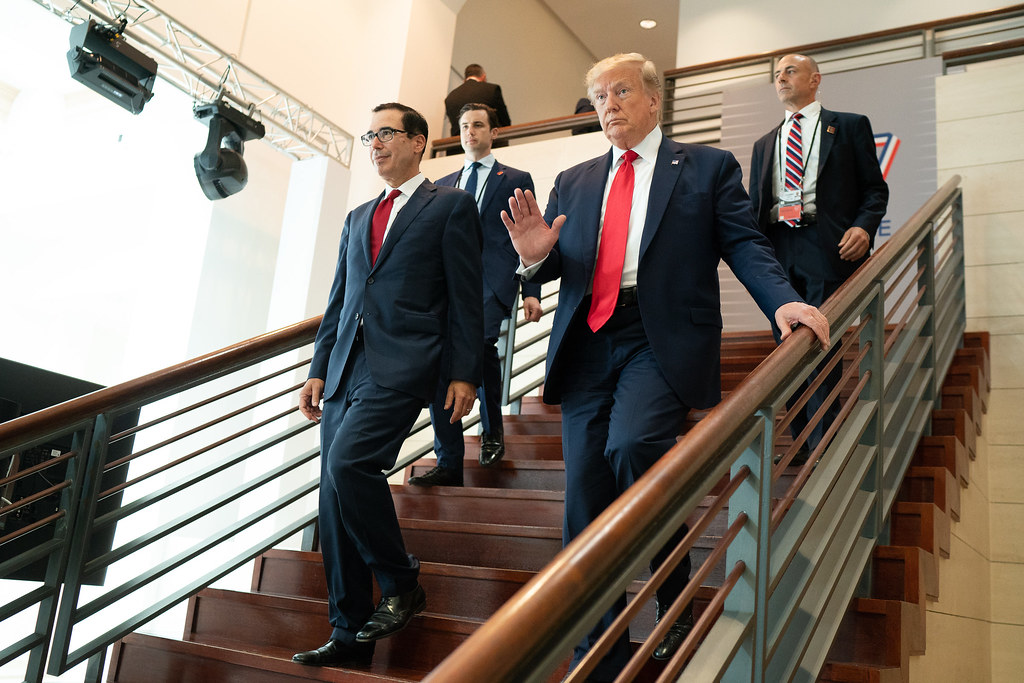How to Reform IEEPA
Over the weekend, President Trump cited a 1977 statute, the International Emergency Economic Powers Act (IEEPA), as providing the legal authority he would need to carry through on his “order” that American companies “immediately start looking for an alternative to China.” IEEPA, which serves as the legal basis for many of America’s economic sanctions programs, almost certainly gives Trump the legal power he claims.

Over the weekend, President Trump cited a 1977 statute, the International Emergency Economic Powers Act (IEEPA), as providing the legal authority he would need to carry through on his “order” that American companies “immediately start looking for an alternative to China.” IEEPA, which serves as the legal basis for many of America’s economic sanctions programs, almost certainly gives Trump the legal power he claims. But Trump’s threat to use the statute to unilaterally remake America’s economic relationship with the world’s second-biggest economy is just the latest twist in a steady, bipartisan presidential expansion of IEEPA that makes the statute overdue for reform.
Democratic and Republican presidents have used IEEPA aggressively and innovatively since the statute was enacted. President Carter deployed IEEPA to sanction the Iranian government after the 1979 Iran hostage crisis. President Clinton used the statute, along with other legal tools, to target the assets of Latin American drug cartels in the 1990s. After the 9/11 terrorist attacks, President George W. Bush used IEEPA to cut off al-Qaeda and other terrorist groups from the international financial system. President Obama used IEEPA to ban Americans from lending money to major Russian banks and energy companies and from helping Russia developing its Arctic and shale oil resources following Russia’s invasion of Ukraine in 2014. And now, Trump has deployed the statute in his “maximum pressure” campaign against Iran and in his bid to dislodge Venezuelan strongman Nicholas Maduro from power in Caracas. IEEPA-based sanctions programs also target interference in U.S. elections, malicious cyber activities, and a growing range of global human rights abuses.
The irony of this expansive use of the statute is that Congress passed IEEPA as part of a legislative package intended to reduce presidential overuse of then-existing emergency powers— particularly the Trading with the Enemy Act (TWEA), a 1917 statute expanded by Presidents Johnson and Nixon to restrict U.S. investment overseas and to impose a 10 percent tariff on many U.S. imports. In response, Congress limited presidential authority under TWEA to times of war. But recognizing that the U.S. needed tools to quickly address emerging national security threats that fall short of war, Congress in parallel enacted IEEPA to give the president broad powers to respond to “any unusual and extraordinary threat, which has its source in whole or substantial part outside the United States, to the national security, foreign policy, or economy of the United States.”
Congress gave the president authority under IEEPA to deploy a range of economic tools to respond to such threats. But to limit presidential overuse of the statute, Congress imposed a set of procedural checks and balances intended to limit use and ensure accountability: Under IEEPA, the president must formally declare an emergency under the National Emergencies Act before imposing measures, and Congress has the right to overturn measures by a concurrent resolution. Presidents also have to renew the measures each year and are required to provide Congress with periodic reports detailing all the measures they take pursuant to the statute.
In reality, however, these procedural checks have become largely toothless due to intervening Supreme Court rulings, disuse and the hyperpartisan nature of today’s politics. For example, the requirement that the president annually renew measures has become a pro-forma exercise that attracts little attention or debate. The required periodic reports generally are not released publicly and reiterate laundry lists of recent actions. What’s more, the Supreme Court gutted Congress’s ability to veto presidential actions under IEEPA with its 1983 decision in INS v. Chadha. In Chadha, which involved an unrelated statute, the Supreme Court found that the separation of powers under the U.S. Constitution requires that Congress can overrule a presidential action only by passing a bill, presenting it to the president for signature and giving the president an opportunity to veto it. As a result, while in 1977 the congressional drafters of IEEPA assumed that a simple majority of Congress would be able to overrule a presidential action under IEEPA, following Chadha, the only way Congress can overrule a presidential action under the statute is by mustering the votes needed to overrule a presidential veto—an extremely high bar for action.
On substance, U.S. courts have been deferential to the president’s authority under IEEPA ever since the Supreme Court’s 1981 decision in Dames & Moore v. Regan, upholding the use of IEEPA sanctions on Iran to suspend the right of U.S. claimants against Iran to seize Iranian property in the U.S. As a consequence, IEEPA has become that which it was explicitly intended not to be—a sweeping statute that presidents can rely on to take essentially any action they want when it comes to U.S. foreign policy.
Nascent discussion has begun on Capitol Hill about reforms to IEEPA as part of legislation that would reassert congressional authorities over U.S. trade policy. For example, Sen. Mike Lee of Utah has introduced a bill that would automatically end actions taken pursuant to the National Emergencies Act, including actions pursuant to IEEPA, unless Congress voted in favor of them within 30 days. Other proposed legislation would require a congressional vote to sustain the president’s use of IEEPA to impose tariffs, but not in other circumstances, or would simply exclude from IEEPA the legal authority to impose tariffs or import quotas.
While Congress’s interest in reform is welcome, legislators should not simply make piecemeal reforms that could both fail to reign in presidential overreach and harm a president’s legitimate use of the statute in response to new national security crises. For example, legislation to exclude tariff and import quota authorities from IEEPA would not stop a president from strangling trade with a country he or she wants to aggressively target, such as China, since the president could still use IEEPA to freeze the assets of a targeted country’s major companies and completely bar U.S. companies from doing business with them. But such legislation would prevent a president from using tariffs or import quotas as a narrowly targeted tool to gradually migrate the U.S. supply chain for a particular piece of equipment crucial to national security, such as telecommunications network infrastructure, from a country hostile to U.S. interests to countries more closely allied with the U.S. And given current legislative dysfunction, proposals to require a congressional vote on measures enacted under IEEPA within 30 days would create serious impediments to addressing an emerging national security crisis such as a coup abroad.
Though Trump’s invocations of IEEPA have been controversial, it’s worth keeping in mind that presidents have declared at least 54 national emergencies invoking IEEPA, and the strong majority of them have been legitimate exercises of power with bipartisan support. There are legitimate reasons for this use of presidential power, and it would be a mistake to react to executive overreach by moving too far in the other direction.
Instead, IEEPA reforms need to be carefully crafted to balance the nation’s legitimate interest in being able to respond to emerging threats quickly, and in unconventional ways, against the need to prevent presidential overreach and ensure adequate checks and balances. The best way to do that is to focus where Congress did in 1977: on a set carefully crafted and balanced procedural reforms. Three in particular would strengthen oversight while still giving presidents appropriate latitude to act in response to genuine crises.
First, Congress should add teeth to the current requirement in IEEPA that the president provide periodic reports on measures enacted pursuant to the statute. Currently, reports pursuant to IEEPA are given only to Congress and generally consist largely of pro-forma lists of actions taken. Congress should require that the reports contain rigorous analysis of the goals of the measures and their economic impacts on both the target and the United States, along with an assessment of the measures’ effectiveness in reaching their goals. And Congress should require that the reports be released publicly. Requiring a rigorous, public analysis of goals, costs and benefits would encourage public and congressional oversight of the measures without unduly constraining the substance of a president’s actions.
Second, Congress should require that administration rules and regulations issued pursuant to IEEPA be made subject to notice-and-comment rule-making, to give all U.S. stakeholders an opportunity to formally weigh in. IEEPA-derived regulations currently govern actions as disparate as the import of Venezuelan oil into the United States to the ability of U.S. banks to lend to Russia’s largest financial institution. But U.S. companies typically have no formal opportunity to provide comments on the regulations, unlike domestic regulations or many other areas of foreign policy rule-making. Even when Trump imposed tariffs on China under Section 301 of the Trade Act of 1974, for example, U.S. companies had multiple opportunities to comment during the administration’s investigation into China’s unfair trade practices and into the specific lists of tariffs Trump proposed by way of retaliation.
Sanctions regulations would be strengthened, and oversight improved, if they were subject to notice-and-comment rule-making. Of course, time can be of the essence in responding to emerging foreign policy crises, and the president should have the right to put the regulations into force before seeking comments if he or she deems it necessary to do so. But even under those circumstances, presidents should be required to make amendments after receiving comments from affected stakeholders.
Third, Congress should require an affirmative congressional vote to sustain actions taken pursuant to IEEPA—but only for actions that have major economic impacts and allowing for ample time before a vote. For example, Congress could require a vote to sustain actions taken pursuant to IEEPA if the annual economic impact to the U.S. was estimated to exceed $1 or $2 billion, which would provide appropriate oversight for major actions while not requiring Congress to vote every time the U.S. imposes a highly targeted sanctions program. Congress should also only require the vote six months to a year after the action is taken, giving the president discretion to act quickly and time to build support for an action before being required to seek congressional authorization.
Congress could also consider modest substantive amendments. In the 1980s and early 1990s, for example, Congress enacted the so-called Berman Amendments, clarifying that IEEPA could not block personal telephone calls and other personal communications or prevent the import of films and media into the U.S. The media and technology landscape has evolved considerably over the past 25 years, and it may be time to update the Berman Amendments to reflect these changes. But the focus of congressional amendments should be a set of serious but nuanced procedural reforms that would right the balance between the U.S. interest in responding quickly to new foreign policy challenges and the interest in preventing presidential overreach.
Economic sanctions have exploded in popularity in recent decades as presidents of both parties have turned to the tool to address an ever-broader set of national security threats, and President Trump is correct to point out that IEEPA gives him the authority to end most U.S. business in China, just as past presidents used IEEPA to end business in Iran, Libya, Sudan and Syria, among others over the years. But this ever-expanding use calls for a package of reforms that would strengthen accountability and maintain our long-standing system of checks and balances.




-(1).jpg?sfvrsn=a0f57148_5)
